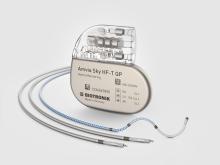Mind & Heart: What’s the Issue?
The mind and the body are closely connected, and this is no exception for heart disease. Developing a heart disease or undergoing a heart device implantation may also directly impact your mental well-being. Patients often report episodes during which they have felt sad, anxious, depressed, angry or guilty. Many also say that they struggled with changes that were related to their disease, such as having to give up favorite activities or foods, making time for exercise in an already busy schedule or taking medication regularly.
But it is not only heart disease that is causing psychological distress – it also works vice versa. Your thoughts, feelings and attitudes have a direct impact on your heart health. Longer periods of negative stress can contribute to the development of heart disease or may worsen an existing condition by:
- Creating direct biological effects, i.e. raising blood pressure, altering the way the body metabolizes carbohydrates and fats, disturbing the heart rhythm and blood circulation.
- Contributing to behaviors that damage your health, such as smoking or poor diet.
- Delaying to seek medical help, ignoring signs of disease or not taking medication regularly.

What You Can Do
While feelings of sadness, anxiety or a temporary loss of confidence in yourself or your body are quite normal after you have been diagnosed with a heart disease or have received an implant, there are meaningful ways to improve your mental well-being.
- Talk to someone: Talking to your partner, relatives or friends about how you feel is a good way to stay connected and to acknowledge your feelings and needs. Joining a dedicated patient group in your community or online may also be a great option to connect with people in the same situation as you.
- Get support: Talk to your partner, friends, family and colleagues about your condition and your needs, for instance when making changes in your lifestyle. Social support is critical.
- Learn more: A cardiac rehabilitation program as well as books, brochures or health websites can help you to learn more about your condition. After all, getting informed about the heart problem at hand is a good way to feel more confident in moving forward with life.
- Reduce stress: Identify the sources of stress in your life and look for ways to reduce and manage them.
- Use exercise or other lifestyle changes: Some changes may not only benefit your heart but also your mind. Gentle exercise, for instance, helps many patients to gain more confidence in their body and to regulate negative emotions.
- Seek help: You cannot be happy all the time. However, if feelings of sadness or emptiness, despair, loss of interest in pleasurable activities or eating and sleeping disorders persist for more than two weeks, speak to your doctor. Your mind is as important as your heart!
- Take one step at a time: When you want to implement changes to improve or maintain your health, focus on changing one existing habit at once (e.g. eating, exercising). Set a reasonable initial goal and work towards it before changing the next habit.


